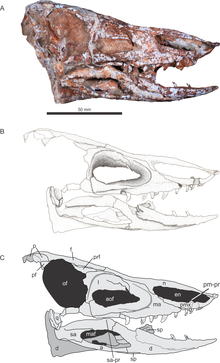Aetosauroides
| Aetosauroides Temporal range: Late Triassic ~ | |
|---|---|

| |
| Skull of A. scagliai | |
| Scientific classification | |
| Domain: | Eukaryota |
| Kingdom: | Animalia |
| Phylum: | Chordata |
| Class: | Reptilia |
| Clade: | Archosauria |
| Clade: | Pseudosuchia |
| Order: | †Aetosauria |
| Genus: | †Aetosauroides Casamiquela, 1960 |
| Type species | |
| †Aetosauroides scagliai Casamiquela, 1960 | |
| Synonyms | |
| |
Aetosauroides (meaning "Aetosaurus-like") is an extinct genus of aetosaur from the Late Triassic of South America. It is one of four aetosaurs known from South America, the others being Neoaetosauroides, Chilenosuchus and Aetobarbakinoides. Three species have been named: the type species A. scagliai, A. subsulcatus and A. inhamandensis. Fossils have been found in the Cancha de Bochas Member of the Ischigualasto Formation in the Ischigualasto-Villa Unión Basin in northwestern Argentina and the Santa Maria Formation in the Paraná Basin in southeastern Brazil. The strata date to the late Carnian and early Norian stages, making Aetosauroides one of the oldest aetosaurs.[1]
Description

Most individuals of Aetosauroides measured around 1.3 metres (4 ft 3 in) in length, with one large individual reaching 2.4 metres (7 ft 10 in) (with histology suggesting an age of 23 years). Sexual maturity was probably reached at 1 metre (3 ft 3 in) in length, although these individuals were not yet fully grown.[2] Sexual dimorphism has been suggested for Aetosauroides, with males reaching the 2-metre (6 ft 7 in) size range.[3]
Aetosauroides was proposed to be synonymous with the genus Stagonolepis in 1996 and 2002.[4][5] Smaller specimens of both species were placed with Stagonolepis robertsoni, and larger specimens were considered to be S. wellesi. This synonymy is not accepted,[1][6][7][8] with several studies identifying unique features that distinguish Aetosauroides from Stagonolepis. Among these are maxillae that do not touch the nostrils, oval-shaped holes on the centra of the vertebrae, and a convex margin of the lower jaw. In a 2011 study, A. subsulcatus and A. inhamandensis were proposed to be synonymous with A. scagliai.[8] Additionally, a contemporary aetosaur named from a juvenile specimen in 2014, Polesinesuchus aurelioi, was found to be similar in its vertebrae and the basioccipital of its braincase to juvenile specimens of Aetosauroides in two 2021 studies, and it was proposed as a junior synonym of the latter.[2][9]
Classification
A phylogenetic analysis presented by Julia B. Desojo, Martin D. Ezcurra and Edio E. Kischlat in 2012 found that Aetosauroides lies outside Stagonolepididae. If this phylogeny is correct, Stagonolepididae and Aetosauria would not be equivalent groupings, and Aetosauroides would be the first non-stagonolepidid aetosaur.[1]
References
- ^ a b c Julia B. Desojo, Martin D. Ezcurra and Edio E. Kischlat (2012). "A new aetosaur genus (Archosauria: Pseudosuchia) from the early Late Triassic of southern Brazil" (PDF). Zootaxa. 3166: 1–33. doi:10.11646/zootaxa.3166.1.1. ISSN 1175-5326.
- ^ a b Paes-Neto, V.D.; Desojo, J.B.; Brust, A.C.B.; Schultz, C.L.; Da-Rosa, A.A.S.; Soares, M.B. (2021). "Intraspecific variation in the axial skeleton of Aetosauroides scagliai (Archosauria: Aetosauria) and its implications for the aetosaur diversity of the Late Triassic of Brazil". Annals of the Brazilian Academy of Sciences. 93 (supp. 2): e20201239. doi:10.1590/0001-3765202120201239. hdl:11336/150258. PMID 34468486. S2CID 237372648.
- ^ Tabora, J.R.A.; Heckert, A.B.; Desojo, J.B. (2015). "Intraspecific variation in Aetosauroides Casamiquela (Archosauria: Aetosauria) from the Upper Triassic of Argentina and Brazil: an example of sexual dimorphism?". Ameghiniana. 52 (2): 173–187. doi:10.5710/AMGH.05.01.2015.2824. S2CID 11498039.
- ^ Lucas, S.G.; Heckert, A.B. (1996). "Late Triassic aetosaur biochronology" (PDF). Albertiana. 17: 57–64. Archived from the original (PDF) on 2013-11-13. Retrieved 2011-05-11.
- ^ Heckert, A.B.; Lucas, S.G. (2002). "South American occurrences of the Adamanian (Late Triassic: latest Carnian) index taxon Stagonolepis (Archosauria: Aetosauria) and their biochronological significance". Journal of Paleontology. 76 (5): 852–863. doi:10.1666/0022-3360(2002)076<0852:SAOOTA>2.0.CO;2. S2CID 128610620.
- ^ Parker, William G. (2007). "Reassessment of the Aetosaur "Desmatosuchus" chamaensis with a reanalysis of the phylogeny of the Aetosauria (Archosauria:Pseudosuchia)" (PDF). Journal of Systematic Palaeontology. 5 (1): 41–68. Bibcode:2007JSPal...5...41P. doi:10.1017/S1477201906001994. S2CID 85826683.
- ^ Parker, W. G.; Stocker, M. R.; Irmis, R. B. (2008). "A new desmatosuchine aetosaur (Archosauria; Suchia) from the Upper Triassic Tecovas Formation (Dockum Group) of Texas". Journal of Vertebrate Paleontology. 28 (2): 692–701. doi:10.1671/0272-4634(2008)28[692:ANDAAS]2.0.CO;2. ISSN 0272-4634. S2CID 84455880.
- ^ a b Desojo, J.B.; Ezcurra, M.D. (2011). "A reappraisal of the taxonomic status of Aetosauroides (Archosauria, Aetosauria) specimens from the Late Triassic of South America and their proposed synonymy with Stagonolepis". Journal of Vertebrate Paleontology. 31 (3): 596–609. Bibcode:2011JVPal..31..596D. doi:10.1080/02724634.2011.572936. S2CID 85418778.
- ^ Paes-Neto, V.D.; Desojo, J.B.; Brust, A.C.B.; Ribeiro, A.M.; Schultz, C.L.; Soares, M.B. (2021). "The first braincase of the basal aetosaur Aetosauroides scagliai (Archosauria: Pseudosuchia) from the Upper Triassic of Brazil". Journal of Vertebrate Paleontology. 41 (2): e1928681. Bibcode:2021JVPal..41E8681P. doi:10.1080/02724634.2021.1928681. S2CID 237518035.
